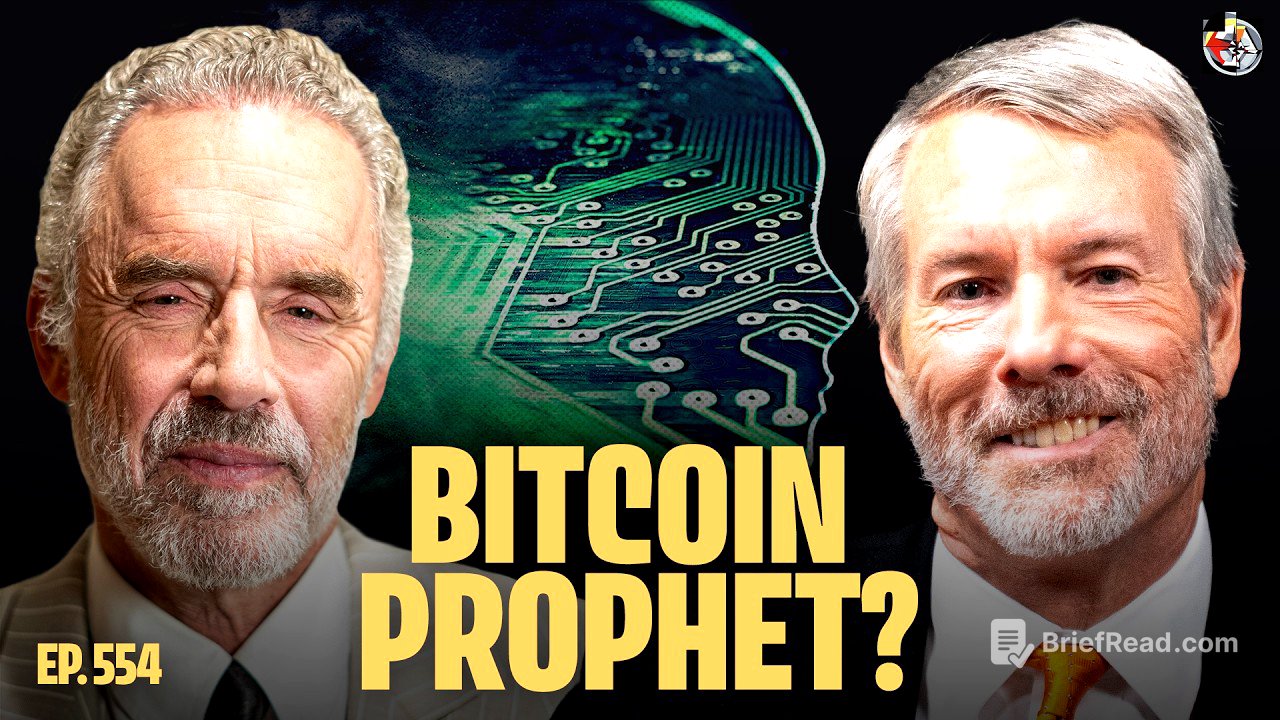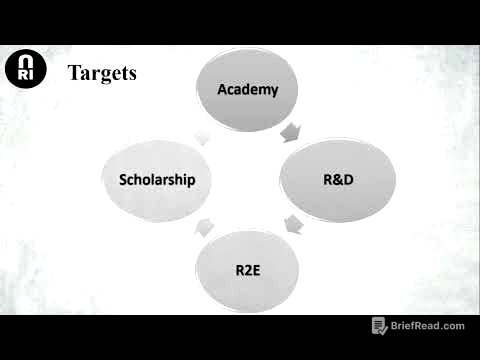TLDR;
Michael Saylor discusses his journey to discovering Bitcoin, his views on its potential as a superior store of value compared to traditional currencies and gold, and the underlying engineering and ideological principles that make it a robust and enduring monetary system. He emphasizes the importance of understanding monetary systems, the flaws of government-controlled currencies, and the revolutionary nature of Bitcoin as a decentralized, thermodynamically sound, and incorruptible form of money.
- Bitcoin as a solution to currency devaluation and government distrust.
- The influence of science fiction and fantasy on technological innovation and understanding complex systems.
- Bitcoin's potential as a perfect monetary network due to its decentralized and incorruptible nature.
Introduction [0:00]
The discussion begins with an overview of currency collapses throughout history, noting that, on average, currencies collapse every 30 to 40 years. Bitcoin is introduced as a potential solution to monetary problems, offering a trustless, decentralized alternative to government-controlled currencies and traditional banking systems. Michael Saylor, is introduced as a successful entrepreneur who has become a prominent advocate for Bitcoin, driven by his deep understanding of technology, finance, and the need for a reliable store of value in an increasingly uncertain world.
Michael Saylor's Background and Early Career [1:03]
Michael Saylor recounts his early career, starting with his enterprise software company, MicroStrategy, which he took public in 1998. He describes his expansionary phase, during which he launched multiple businesses, some successful (like Alarm.com) and many that failed. By 2010, he refocused on MicroStrategy's core business, experiencing both professional stagnation and personal financial success through investments in tech stocks like Amazon and Apple.
The Centralizing Tendency of the Mobile World [13:04]
The discussion shifts to the centralizing effects of the mobile world, where a few dominant companies, such as Apple, Amazon, Google, and Facebook, have created digital monopolies. This is because software functionality can be rapidly deployed to billions of users, creating winner-take-all scenarios. Michael Saylor attributes his investment success to recognizing this trend early and betting on companies that provide essential services that are difficult to stop and not widely understood.
The Influence of Science Fiction and Fantasy [15:16]
Michael Saylor discusses the influence of science fiction and fantasy on his thinking, particularly the works of Heinlein, Clarke, and Asimov. These genres fostered his imagination and ability to envision future possibilities. He also touches on his academic background at MIT, where he studied astronautics and system dynamics, further shaping his understanding of complex systems and paradigm shifts.
The Power of Names and the Mobile Wave [20:50]
Michael Saylor explains how his interest in the power of names, inspired by fantasy literature, led him to acquire numerous domain names in the early days of the internet. He also discusses his book, "The Mobile Wave," which predicted the dematerialization of software and the rise of mobile technology. This fascination with technology and its transformative potential set the stage for his later interest in Bitcoin.
The Use of Imagery and Metaphor [27:52]
Michael Saylor reflects on his communication style, particularly his use of imagery and metaphor. He emphasizes that in an age of information abundance, concise and evocative communication is more effective than lengthy explanations. He uses the analogy of "angels and demons" to describe the forces at play in cyberspace, capturing the attention and imagination of his audience.
The Frustrations of a Plateaued Career [35:55]
Michael Saylor describes his frustrations with MicroStrategy's low growth despite his and his employees' hard work. He felt he had reached a plateau and was not making the impact he desired. This dissatisfaction, combined with his personal financial success from tech investments, led him to seek new avenues for growth and change.
The Role of Parental Influence and Early Programming [38:59]
Michael Saylor credits his ambition and drive to his parents' influence. His mother instilled in him a belief that he could change the world, while his father emphasized a strong work ethic and sense of duty. This early programming, combined with the inspirational themes in science fiction, shaped his mindset and desire to achieve something significant.
The Paradigm Shift and the War on Currency [46:11]
Michael Saylor discusses Thomas Kuhn's concept of paradigm shifts and how they are often embraced by the youth or after a crisis. He recounts his initial dismissal of Bitcoin in 2013, followed by his reevaluation during the COVID-19 pandemic. The pandemic created a "war on currency," with governments printing money and devaluing traditional assets, prompting him to seek an alternative store of value.
The Economic Impact of COVID-19 [48:20]
Michael Saylor describes the economic bifurcation caused by the COVID-19 pandemic, where Main Street businesses were devastated while Wall Street investors thrived due to government policies. The lowering of interest rates and printing of money led to hyperinflation in financial assets, making traditional investments unattractive. This environment pushed him to reconsider Bitcoin as a potential solution.
The Search for a Store of Value [55:26]
Faced with the devaluation of traditional assets, Michael Saylor began searching for a reliable store of value. Real estate and stocks were inflated, and collectibles were impractical. He grappled with the fundamental question of what constitutes money, seeking a liquid, fungible asset that could preserve economic energy over time.
The Re-evaluation of Bitcoin [59:34]
Michael Saylor revisited Bitcoin, spurred by a conversation with a crypto entrepreneur. He immersed himself in research, studying the works of Andreas Antonopoulos and reading "The Bitcoin Standard." He concluded that Bitcoin offered a non-sovereign store of value, superior to gold due to its fixed supply and digital properties.
Bitcoin as Digital Gold [1:01:34]
Michael Saylor explains his view of Bitcoin as digital gold, addressing concerns about its long-term viability. He argues that Bitcoin is an ideology manifested as a protocol and materialized as a network, making it highly resilient. He compares it to a divine bank, offering a secure, incorruptible, and decentralized monetary system.
The Thermodynamic Soundness of Bitcoin [1:15:53]
Michael Saylor emphasizes the thermodynamic soundness of Bitcoin, drawing on his engineering background. He explains that Bitcoin is based on mathematical consistency and integrity, ensuring that 1 + 1 always equals 2. This principle is essential for building a reliable and predictable system, free from manipulation and corruption.
Bitcoin as a Perfect Monetary Network [1:19:17]
Michael Saylor describes Bitcoin as a perfect monetary network created with imperfect components. He draws an analogy to John Harrison's invention of the perfect clock, which solved the problem of calculating longitude. Bitcoin's decentralized nature and fault tolerance make it resilient to attacks and failures, ensuring its long-term survival.
Conclusion [1:26:09]
The conversation concludes with a summary of Bitcoin's key attributes and its potential to empower individuals by preserving the fruits of their labor. Michael Saylor emphasizes that Bitcoin is not just about keeping money but about maintaining reputation and prosperity over time, free from parasitism and corruption.









